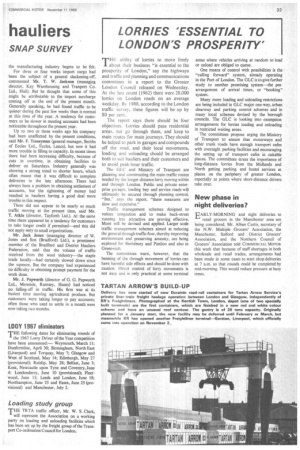LORRIES 'ESSENTIAL TO LONDON'S PROSPERITY'
Page 35

If you've noticed an error in this article please click here to report it so we can fix it.
THE ability of lorries to move freely about their business "is essential to the prosperity of London," say the highways and traffic and planning and communications committees in a report to the Greater London Council released on Wednesday. At the last count (1962) there were 28,000 lorries on London roads on an average weekday. By 1980, according to the London traffic survey, these figures will be up by 80 per cent.
The report says there should be four objectives. Lorries should pass residential areas, not go through them, and keep to main routes for main journeys. They should be helped to park in garages and compounds off the road, and their local movements, loading and unloading should be arranged both to suit hauliers and their customers and to avoid peak-hour traffic.
The GLC and Ministry of Transport are planning and constructing the main traffic routes needed by the longer distance lorry moving within and through London. Public and private enterprise garages. loading bay and service roads will ultimately he secured through planning control. "But,says the report, "these measures are slow and expensive."
Traffic management schemes designed to reduce congestion and to make back-street running less attractive are proving effective. More will be devised and applied. Larger scale traffic management schemes aimed at reducing the general through traffic flow, thereby improving environment and preserving amenity, are being explored for Barnsbury and Pimlico and also in Greenwich.
The committees warn, however, that the banning of the through movement of lorries can have harmful side effects and should be done with caution. Direct control of lorry movements is not easy and is only practical at some terminal areas where vehicles arriving at random to load or unload are obliged to queue.
One means of control with possibilities is the "calling forward" system, already operating in the Port of London. The GLC is to give further study to another promising system—the prearrangement of arrival times, or "booking" system.
Many more loading and unloading restrictions are being included in GLC major one-way, urban clearway and parking control schemes and in many local schemes devised by the borough councils. The GLC is looking into exemption arrangements for lorries loading and unloading in restricted waiting areas.
The committees propose urging the Ministry of Transport to ensure that motorways and other trunk roads have enough transport cafes with overnight parking facilities and encouraging the setting up of transport cafes in suitable places. The committees stress the importance of long-distance lorries from the Midlands and North getting parking and hostel services at places on the periphery of greater London, especially at points where short-distance drivers take over.
































































































































